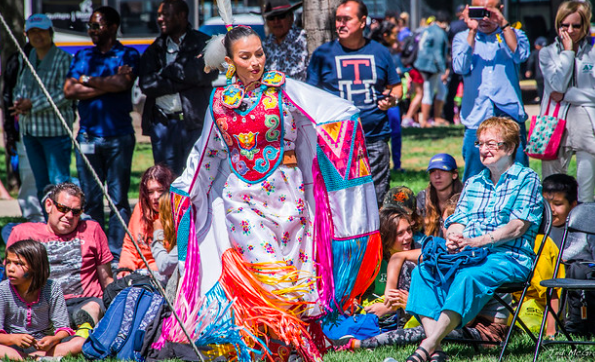How a village leader changed the perception of women in India, one tree at a time.
Girls connecting with the trees in Piplantri. Photo provided by Piplantri Village.
Every time a baby girl is born in Piplantri, India, the village gathers together to plant 111 trees in her honor. The custom began a couple of years ago, when former village leader, Shyam Sundar Paliwal was forced to ponder the fleetingness of life after his daughter tragically passed away at a young age.
Piplantri and other villages in the area were facing two crises that greatly affected the quality and value of life. One issue was social: a high rate of female infanticide. Traditionally, female births were considered a burden on the family. The parents of a girl are expected to provide a dowry to her husband’s family, which can be a big financial undertaking. Additionally, daughters were married off well before the age of 18, before they could obtain an education.
Piplantri and its surrounding villages faced environmental hardships as well. The villages in the Rajasthan area are suffering from deforestation with the increase of marble mining.
Paliwal decided to confront these issues with a plan that can be broken down into three words: “Daughter, Water, Trees.”
To counter the pessimism around the birth of a baby girl—and improve the lives of the daughter and her family—the village raises money for a “trust” every time a girl is born. The family is to contribute one third of the fund, which is set aside until the girl turns 20. This alleviates the problem of the financial burden of a dowry.
In order for the family to receive the money, they must sign an affidavit agreeing not to marry their daughter until she is of the legal age of 18 and has received a proper education.
To solve the deforestation problem, the village gets together to plant 111 trees in the girl’s honor. As a part of the contract, the family agrees to take care of those 111 trees. Hopefully the trees will help the spread of water along the land.
And the scheme gets even better. The fruit trees being planted were beginning to attract a lot of termites. In order to prevent infestation, the villagers planted many aloe plants to protect the trees. The villagers can harvest and sell the aloe—which has incredible healing benefits—and make a profit, to even further improve their quality of life.
Although Paliwal is no longer the leader of the village, the tradition continues. Now, teachers report that there are just as many girls enrolled in school as boys. And, the village is lush and green with the hundreds of trees planted.
Other villages are following suit. The nearby village of Tasol is trying out Piplantri’s eco-feminist village model.
RELATED CONTENT:
ELIANA DOFT
Eliana loves to write, travel, and volunteer. She is especially excited by opportunities to combine these three passions through writing about social action travel experiences. She is an avid reader, a licensed scuba diver, and a self-proclaimed cold brew connoisseur.









